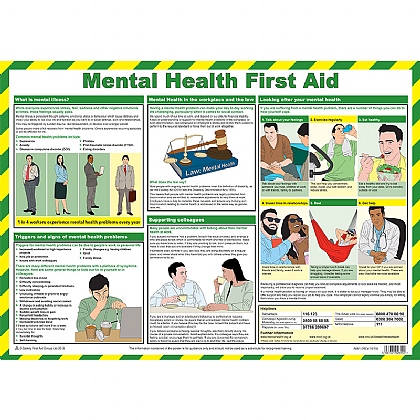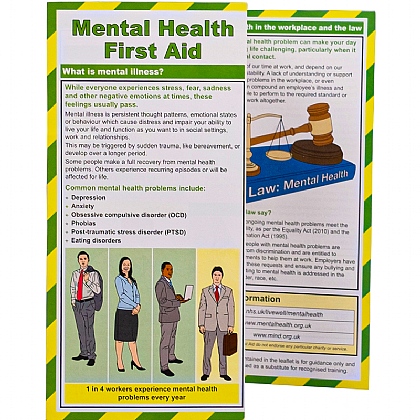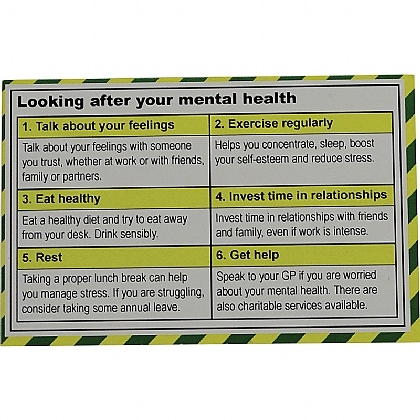
Mental health refers to our psychological, emotional and social well-being. Not only does it govern how you think, feel and act, but it also affects how you relate to others, how you deal with pressure, and how productive you can be.
Mental and physical health are connected and equally important components of overall health. For example, depression and anxiety can increase the risk of a multitude of serious physical health issues including heart disease, diabetes and stroke. It works vice versa as well, as chronic physical illnesses can increase the risk of mental illnesses such as depression.
Mental health first aid is the first step towards giving a friend, family member or co-worker the support they need to overcome any difficulties they may be experiencing.
What is Mental Health First Aid?

Mental health first aid is a training program designed to teach the public how to better identify, understand and support someone suffering from poor mental health. Like traditional first aid, mental health first aid is not therapy and doesn’t teach you how to treat or diagnose mental illness. Rather, the training helps you to understand how to offer immediate support to someone in crisis until the appropriate professional help can be received.
The MHFA training program gives you an action plan to use when offering support to someone who may be in a difficult situation. The action plan, known as ALGEE, has five steps:
- A — Approach and look for signs of anxiety or trauma. Try to find an appropriate time or place to speak to the person, keeping their privacy in consideration. If the person isn’t comfortable speaking to you, encourage them to speak with someone they trust.
- L — Listen nonjudgmentally. Make sure you allow the person to share without interrupting them. Try to have empathy for their situation, even if you disagree with them.
- G — Give reassurance and information. After you have listened to the person, reassure them, offer support, and provide them with useful information.
- E — Encourage the person to seek the appropriate professional help. Just like with physical illnesses, the earlier the person gets help the better their chances of recovery are. Ensure the person is aware of the ways in which a professional can help them.
- E — Encourage self-help and other support strategies. Help the person to identify their personal support network and inform them of the techniques they can use to help themselves.
The ALGEE action plan doesn’t have to be enacted in sequence; each step of the plan can be done in any order or even simultaneously.
Why is Mental Health First Aid so Important?
Recognising the initial warning signs of mental suffering is crucial for intervention. Mental health first aid helps trainees to spot early signs in someone who is struggling to prevent issues from worsening. They can also prevent crises like self-harm or suicide by encouraging someone to seek relevant help.Mental health concerns are also a financial issue, much like physical health, and cost UK employers an estimated £35 billion each year in sickness absence, reduced productivity and costs of staff replacement. Almost 300,000 people lose their job each year because of mental health conditions. Mental health first aiders act as a support system in the workplace to support individuals with mental illness conditions to recover quickly, reducing the negative impact.
Mental Health in the Workplace
Good practices should be encouraged in the workplace. To supplement the presence of mental health first aiders, information should be readily available to all employees to increase awareness.
Mental Health First Aid Poster
The mental health first aid guidance poster is designed to provide both first aiders and non-first aiders with essential information. Placing these posters around your workplace will raise awareness of these conditions throughout your organisation.
Mental Health First Aid Leaflet
The mental health first aid leaflet provides useful information about mental health first aid and can be handed out to employees to provide guidance on a more individual basis.
Mental Health Guidance Card
The mental health guidance card provides useful information in a portable form and can easily be handed out and carried around the workplace.
Do Mental Health First Aiders Need to be Qualified?

While every employee should do their part to raise awareness in the workplace, individuals who have received training as part of a Mental Health First Aiders Course are best equipped to provide support on a first aid basis.
Being a mental health first aider doesn’t qualify an individual as a psychiatrist or therapist, but the qualification is still important, as it grants the knowledge needed to spot warning signs and reassure someone who has a mental illness.
Support Benefits Everyone
Mental health first aid in the workplace is beneficial to both business and employee, and is crucial to a functional, efficient and happy workplace. Support from colleagues and senior management is vital in helping individuals overcome mental illnesses, and mental health first aid gives employers and employees the knowledge they need to respond to someone in a moment of need.Taking the simple steps to improve the management of both mental and physical health in the workplace allows employers to save considerably on the negative costs associated with all health conditions, financial or otherwise. Consider registering your employees for a Mental Health First Aiders Course to foster a strong support network in your workplace.
Read our blog for more information on first aid, or contact us for further advice and information on our products.
About the author:
Jo Stokes is a writer, marketer and trained first aider at First Aid Online.
Find out more about Jo.
By Jo Stokes




